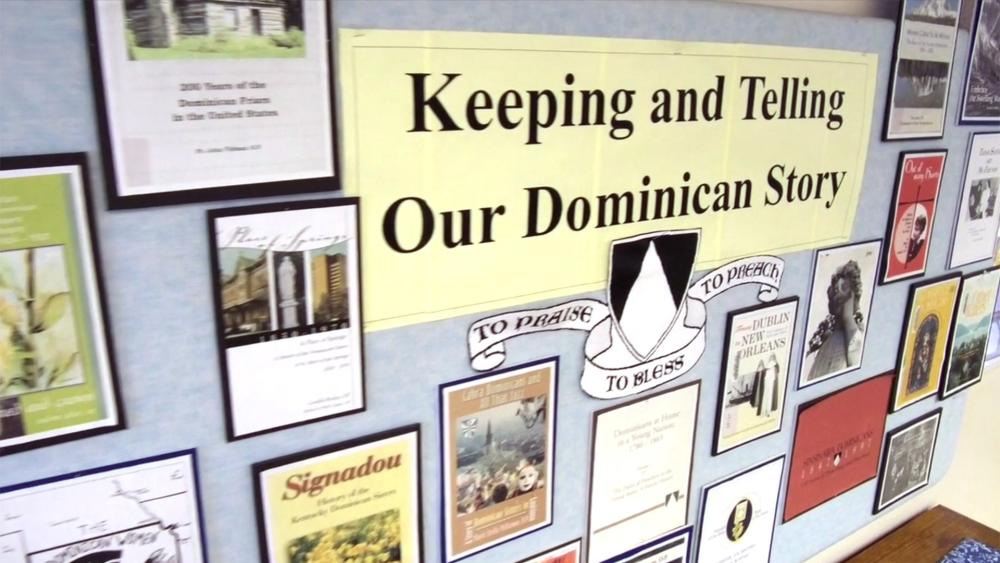DU's Connection to the 1968 Democratic National Convention in Chicago

With the Democratic National Convention returning to Chicago, the McGreal Center for Dominican Historical Studies at Dominican University is sharing some history of Rosary College’s ties to the convention held in 1968—and the civil unrest and protests that accompanied it.
During a discussion with current English professors Dr. Sheila Bauer-Gatsos and Dr. Maggie Anderson, Dr. Rosalind Hays, retired history professor, recalled how about 20 members of the Rosary College community—both faculty and students—took a stand against the convention violence inflicted by police.
“A lot of us went downtown as a group to protest the way the police acted during the convention,” Hays recalled. “When we marched, the police were lining the route, and you’d look at them and they were turning bright red (with anger) …. I could tell, these were people who really resented the marchers.”
Hays also shared that some Rosary faculty were downtown during the initial unrest as well, with one professor thrown through a broken glass window.
Hays’ remarks had be heard here.
The McGreal Center and School of Information Studies student Kelly Clark also shared the following about another connection between Rosary College and a controversial figure connected to the convention:
“The Democratic Convention’s anti-Vietnam war protests that summer of 1968 produced the Chicago Seven—defendants accused of conspiracy and intent to riot. Those men were represented by civil rights attorney William Kunstler. When guest lecturer Kunstler had his invitation to speak at Rosary College rescinded due to security threats from the local community, faculty came together over three days and argued to bring Kunstler to campus. Rosalind Hays claims to have been the loudest at these meetings, but she states that Political Science Professor George Anastaplo was the main arguer.”
Hays’ memory of this time was recounted in a blog post eulogizing Anastaplo following his death in 2014:
“My most vivid memories of George came during the brouhaha that ensued when a student group invited William Kunstler to speak on campus. The event had been set up, and when people in the neighborhood heard about it, there were threatening phone calls. Sr. Candida canceled Kunstler’s appearance, particularly when, as I understand it, she tried to find insurance for the event. The premium asked was enormous.
“There was a lot of negative reaction to the cancelation. George proposed a HUGE, multi-part resolution. I don’t remember all the pieces of it. But when it came before the Academic Council, we ended up debating that resolution for, as I remember it, at least 10 hours in several meetings. I, of course, supported most or all of the resolution. George had a funny position on campus. He tended not to come to Academic Council meetings unless he was interested in something specific. His usual absence was touted by opponents of the resolution. But, of course, he was also enormously eloquent about the freedom of speech issues involved in canceling a proposed appearance by a controversial figure. And there were a bunch of Rosary faculty who agreed with him.
“At the end of all the meetings the Academic Council voted to urge the president to re-invite Kunstler. He did appear. Although lots of supporters of the appearance were trained in crowd control and so on, the appearance came off without incident. There was much more fuss at a later appearance of some of the peace agitators from Northern Ireland who drew protestors from all across the city.”
The McGreal Center also shared the following:
“A fierce proponent for free speech, Mr. Anastaplo resigned from his chair position until Kunstler was allowed to lecture at the college. Anastaplo was a lifelong supporter of civil rights, and his refusal to reveal his political and religious affiliations prevented his acceptance to the Illinois State Bar Association, even after earning his law degree from the University of Chicago. Defending himself, Anastaplo took his argument to the Supreme Court, where he ultimately lost, although he was strongly supported by Justice Hugo Black in Black’s lone dissent.
“Over a lengthy career, Anastaplo continued to stress the importance of civil liberties in the many books he authored and the lectures he gave around the country as well as in the classroom during his nearly sixty years teaching at the University of Chicago and later at Loyola University Chicago School of Law. Those heated, and according to Hays, ‘most wonderful,’ 11 hours of parliamentary discussion to keep Kunstler on the books were a promising beginning for Anastaplo’s long career of social justice.”
Listen to Anastaplo’s 1986 account of his denial into the Illinois State Bar Association here.
With faculty, staff, Sisters and student partners, the McGreal Center for Dominican Historical has collected 30 original oral histories about the Dominican University’s history. Some of these are already available, and others will be uploaded, with transcripts, at the Dominican University Centennial Oral Histories site.